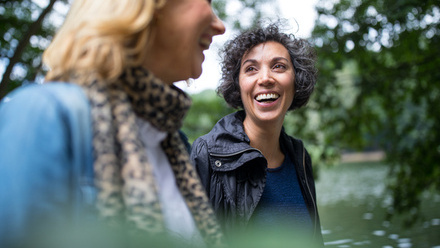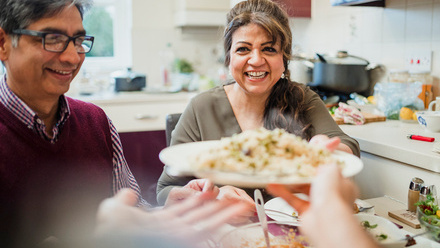We profile two dietitians – a clinical (diabetes) dietitian and an industry (food) dietitian – to find out more about their areas of work, what their day-to-day job involves and the different type of people that they meet
Clinical (diabetes) dietitian
Paul McArdle BSc (Hons) MA RD MBDA, Lead Clinical Dietitian & Deputy Head of Birmingham, Community Nutrition
Paul McArdle BSc (Hons) MA RD MBDA, is a Lead Clinical Dietitian & Deputy Head of Birmingham Community Nutrition and has been working as a dietitian for over 15 years, most of that time in diabetes.
Diabetes can negatively affect quality of life and I became a diabetes dietitian because diet can have such a positive impact. I was inspired by two dietitians who trained me and showed how a supportive approach to people with diabetes makes such a difference. I work in a community service and see patients both in health centres and around the city.
"We help people make changes that will improve their health, or treat a condition such as diabetes"
If you’ve never seen a dietitian, you’d be forgiven for thinking that we give out ‘diet sheets’ or tell people what not to eat. In reality, we help people make changes that will improve their health, or treat a condition such as diabetes. We do this by offering information and counselling to help people find solutions that will work for them over the long term. Dietitians help people find solutions that will work for them over the long term.
So what is a typical day in the life of a diabetes dietitian?
06:30 Wake up, walk the dog, eat breakfast (usually cereal because it’s quick and easy and I like milk!).
07:45 Travel to clinic. Clinics usually start about 09:00am so I need to get there in time to set-up, allowing time to talk to the receptionist so we are both informed about the day ahead. After firing up the computer systems, I talk to the diabetes specialist nurse (DSN) and look at our list to see who’s coming. I work alongside a DSN in all my clinics. Our patients are mostly referred by their GP or practice nurse, so we check each referral to see why the patient has been referred, or review our notes if we’ve seen them before.
09:00 Patients arrive (hopefully!). We do sometimes have patients who don’t turn up, despite having been reminded. These are called ‘DNAs’ – Did Not Attend. We use this time to do other things, like return phone calls or emails to patients, or read a research article so we can stay up to date.
There’s usually about six to seven patients in a clinic – which lasts a whole morning or afternoon. That may not sound a lot, but having 30 minutes with each patient is important because this is a specialist clinic, and it can take time to fully explore all the issues before agreeing a treatment plan that is
individual to each patient.
Birmingham is a very multicultural city so patients are a mix of Type 1 and Type 2 diabetes from all ages, backgrounds and ethnicities.
09:30 First patient: A woman with Type 2 diabetes for about 10 years. We talk about her experience of diabetes and about her concerns. She’s reluctant to start insulin, but that’s why her GP has referred her. After exploring this further, she decides she could lose alittle weight by reducing her portion sizes and being a bit
more physically active. As a result, before deciding upon any medication amendments, we agree on some changes and plan to review how it’s going in a month.
12:30 End of clinic: I catch up with the DSN to assess how clinic went, confirm our treatment plans for each patient, write up my notes on the computerised records system and then eat my lunch!
13:00 Travel across the city.
13:30 Set-up for a group session:
Get the resources out, arrange the room and make sure there are refreshments. "I was inspired by two dietitians who trained me and showed how a supportive approach to people with diabetes makes such a difference"
14:00 Group Education Session for Type 1 Diabetes.
A group of about eight patients meet for a three-hour session on estimating carbohydrate and adjusting their insulin doses. It’s fun and involves lots of practical examples, food models and pictures of food.
17:00 Finish group session:
Clear up, complete computerised records, travel home.
18:45 Arrive home:
Make dinner, walk the dog and…relax!
Industy (food) dietitian
Alyson Greenhalgh-ball, Senior Director Nutrition, Scientific and Consumer Affairs EMEA of a large food comapny
With over 20 years’ experience in the Public Health Sector, Alyson is a Senior Director for EMEA of a large food company. Her early experience was as a clinical dietitian before moving over to academia and latterly the commercial sector.
Like many young adults, my career choice was shaped by a desire to work in a field that didn’t just pay the bills, but in some small way contributed to making a difference to society, initially in clinical Dietetics then moving into research in nutrition epidemiology focusing on Diabetes & Cancer.
Today, my work impacts on the lives of more people than I could have imagined. Whilst my qualifications, training and experience in the field are called on constantly, they now form the foundations for a management and leadership role that’s a world away from my clinical nutrition roots.
No two days are ever the same. As part of the Research, Nutrition and Quality organisation I am based in Manchester, UK, but my regional role covers Europe, Middle-East, Russia and Africa - a rich array of cultures to navigate and understand. My team are based across these countries so I spend much of my time with them on conference calls. Nutrition permeates everything my food company does so my role has a very wide remit both internally and externally.
My colleagues include the legal team, marketing, sales, regulations, public affairs, food developers, artwork planners, designers, digital, promotions and sustainability.
Food development forms a big focus for the team, often working on as many as 100 new foods at any one time. It can take many years to get the perfect recipe and technical solution. I advise the food development team on what the nutrition profile of the food should be and why; balancing taste, needs (and wants) of the consumer and regulations. We advise on ingredients such as type of grains, seeds and nuts and tailor any fortification as necessary, often recognising where there is a nutrient
gap in the population. Since many foods are made for an entire region, we have to ensure we meet all the needs and regulations from every country, which can be challenging with such diverse opinions about food and nutrition.
Innovation is as much about renovation too, changing an existing food to improve the nutritional profile by lowering fat, sugar or sodium or adding positives such as fibre, wholegrain or micronutrients. Changing a food that millions of people have loved for years can be daunting. We have to be very careful when changing recipes, working out a technical solution, doing lots of sensory, quality and food safety testing and understanding how we make it work within the factory setting.
Packaging and labelling is another focus area. We have products in over 60 countries with over 30 languages and last year we approved over 6,000 different packs. We look carefully at the legal elements of the pack, the nutrition label and the front of pack, the legal description and the imagery to ensure we get it perfect and within regulations. We are involved in communications, advising on what we can (and more importantly cannot) say whether in TV ads, radio, digital, and in supermarket promotions. As a company spokesperson, I’m often required to go on TV and radio talking about topical issues, so I have to be on message – it is nerve-racking, but I love the adrenalin of a live interview.
I travel extensively with my role; all over the region to team meetings, conferences, meeting Government officials, universities and food industry groups. I enjoy this aspect and have done much work on labelling, portion sizes, and reformulation, both internationally and within the UK.
I love the constant challenge of working in industry and I never stop learning. To help shape foods nutritionally that millions of people eat every day is an honour, if not a little daunting at times!







